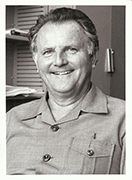

|

|
IN MEMORIAM
Arthur R. Jensen
Professor of Education, Emeritus
UC Berkeley
1923-2012
Arthur Robert Jensen, who served for three decades as an educational psychologist in the Graduate School of Education at the University of California, Berkeley, died in Kelseyville, California, on October 22, 2012. Before earning a doctoral degree in psychology at Columbia University's Teachers College in 1956, Jensen had received a B.A. from UC Berkeley in 1945 and a M.A. from San Diego State College. His doctoral degree was followed by two years of postdoctoral research at the University of London’s Institute of Psychiatry, where he studied with Hans Eysenck who was best known for his work dealing with intelligence and personality.
In 1958 Jensen joined the faculty at UC Berkeley where his work focused upon the influences of genetics, development, and culture in learning. On the basis of his research Jensen postulated two types of learning ability: (1) associative learning (e.g., retention of input and memorization) and (2) conceptual learning (e.g., ability to transform information and solve problems). This helped prompt his interest in the testing of school children. He drew from his research such conclusions as “conceptual learning” occurs more frequently among Asians and therefore Asian Americans are more intelligent than white Americans. His years at Berkeley substantially defined his theory, which many found to be controversial, that IQ differences can be explained especially by genetic differences among ethnic groups.
In 1967 he received a Guggenheim Fellowship to study at the Center for Advanced Study in the Behavioral Sciences at Stanford, where he planned to do research for a book about how cultural deprivation depresses the intelligence of minorities. While at the Center he studied the genetics of intelligence and completely changed his views. Instead of writing a book, he wrote his famous article “How Much Can We Boost IQ and Scholastic Achievement?” (Harvard Education Review, 1969) in which he argued that IQ tests are valid and reliable, they are not biased against minorities, social mobility means that the genes for high IQ are concentrated in higher social strata, and there is a substantial genetic contribution to both individual and group differences in intelligence. The article and his assertions about intelligence and such things as school integration and Head Start fueled considerable controversy and prompted many individuals to deem him racist and some UC faculty to attempt to formally censure him.
Jensen spent much of his career defending and trying to explain his findings and statements. In 1980 he published a book titled Bias in Mental Testing in which he stated that more studies were needed regarding such matters. Two years earlier, in an interview with the Daily Californian, Jensen stated that people who labeled him racist were misguided. “Racist means a person who wants to treat people differently on the basis of race, rather than on individual differences,” he maintained, “I never advocated that.” He also disagreed with people who wanted to use his research to support segregated schools. “I'm not saying ‘classify children,’” Jensen stated. “But teach them in ways that they seem to be learning. We shouldn’t make school a series of failures for students with lower learning abilities.” Few people refuted his research methods, though many disagreed with his conclusions, including cultural anthropologist Margaret Mead, who attempted to block his nomination as a fellow of the American Association for the Advancement of Science. Jensen was, however, named a fellow of that organization (AAAS) as well as of the American Psychological Association.
When Jensen’s Danish colleague Helmuth Nyborg published The Scientific Study of General Intelligence: Tribute to Arthur R. Jensen in 2003, he included comments from students such as: “the finest examples of college teaching I have ever experienced;” “I cannot imagine a better mentor;” “he showed astonishing patience with his critics;” “the toughest reviewer around;” and, “his own thirst for knowledge is infectious.”
Jensen's wife, Barbara, died in 2007. He is survived by a daughter, Roberta Ann "Bobbi" Morey, and a grandson.
Dara Tom, Communications & Public Relations, Graduate School of Education
Committee on Memorial Resolutions, Academic Senate